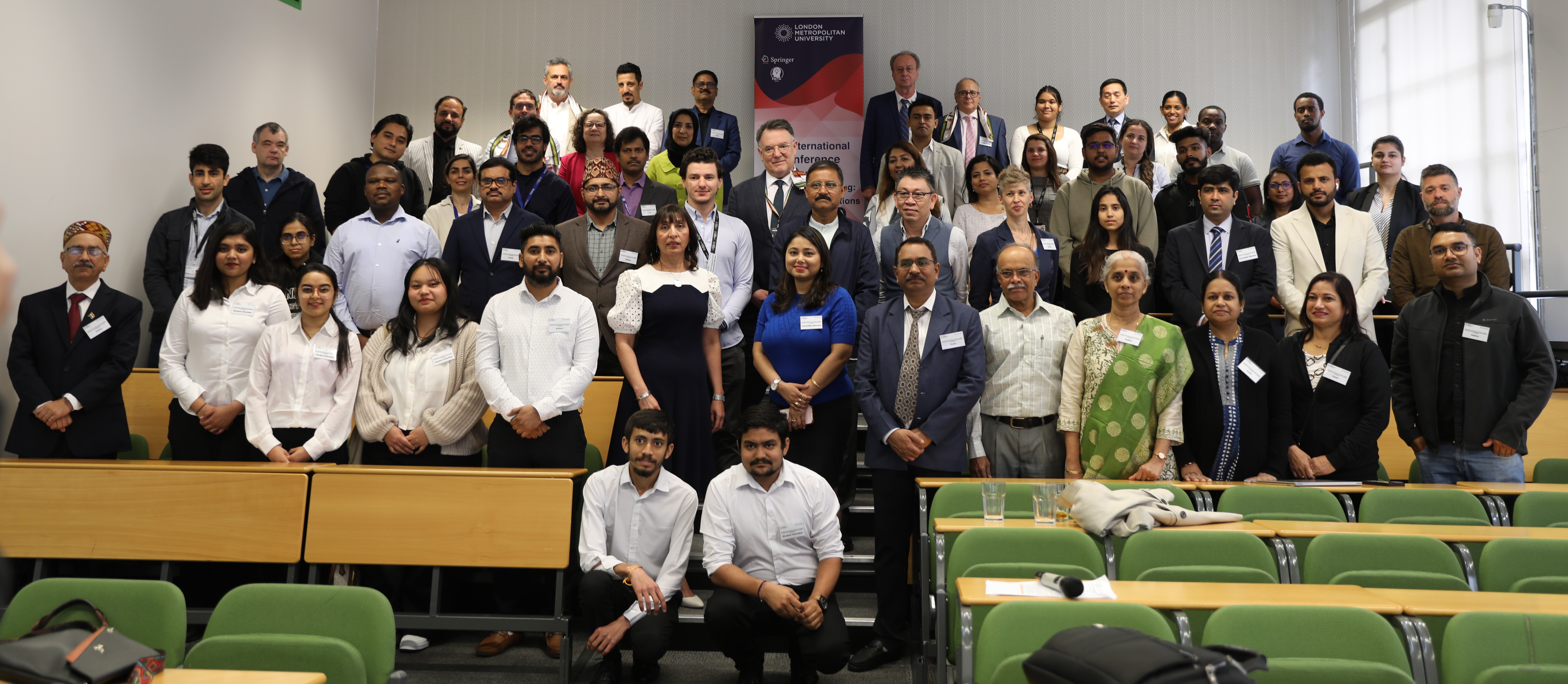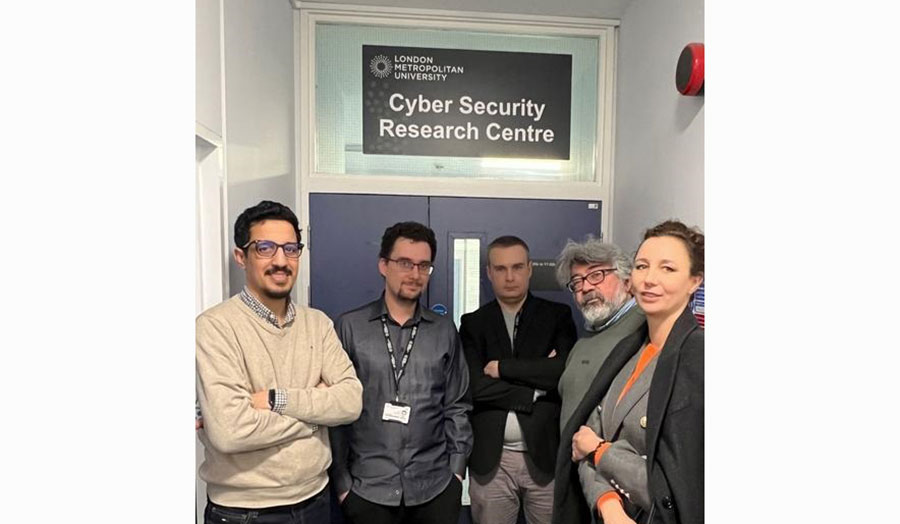Apply for this course
Please select when you would like to start:
Use the apply button to begin your application.
If you require a Student visa and wish to study a postgraduate course on a part-time basis, please read our how to apply information for international students to ensure you have all the details you need about the application process.
Why study this course?
Our Cyber Security MSc degree is the ideal choice if you want to progress or start your career in the digital industry as a cyber security specialist. The course covers the broad topics essential to cyber security and forensics and will expose you to a range of open-source and licence-based security and forensic tools.
This hands-on master’s degree in cyber security will cover how artificial intelligence techniques can be used in detecting risks, preventing criminal activity, and forecasting illegal activity. You’ll also develop practical skills using industry software tools and environments and work with external organisations to develop practical knowledge in real-life scenarios.
Preparing you for industrial certification
Aligned with industry, this course offers you access to fully licensed software and frameworks encompassing cyber security, ethical hacking and digital forensics
Cross-learning opportunities
This course provides the opportunity to cross-learn between cyber security, artificial intelligence and data analytics
Input from industry partners
This course was put together with the help of industry partners
Course modules
The modules listed below are for the academic year 2024/25 and represent the course modules at this time. Modules and module details (including, but not limited to, location and time) are subject to change over time.
Year modules
Advanced Ethical Hacking and Security Compliance
This module currently runs:autumn semester - Friday morning
(core, 20 credits)
This module is designed to introduce principles underlying computer and network security auditing, securing, and penetration testing. It also introduces tools used to assess and validate the security posture of a network and its applications. This module will mainly employ experiential learning. The students will learn through a series of theory-based lectures and associated practical classes and workshops based on each of the module’s topics. Students will develop their skills by applying their knowledge and techniques to discover vulnerabilities and develop exploits in a range of real-world scenarios. Directed and independent study activities will underpin the materials presented and provide opportunities for students to put theory into practice in real-world use cases.
There is extensive exposure to network/system threats and vulnerabilities. Students will assess the various security and configuration features required to secure networks and systems. This module also focuses on guiding students for further specialisation in vendor-neutral security certification programs such as GIAC, ISC, EC-Council, ISACA networking with industry experts and engaging in professional bodies such as BCS-ISSG.
The aim of the module is:
• To provide students with knowledge of the fundamental principles and techniques employed in auditing systems, securing networks and penetration testing.
• To create awareness of the need for security in computer and communications systems.
• To appraise a security policy and network security posture.
• To enable students to assess security risks and be able to apply appropriate mechanisms to counter the risks
Read full detailsCyber Forensics
This module currently runs:autumn semester - Monday morning
(core, 20 credits)
This module seeks to provide students with a theoretical and practical systematic understanding of the cyber forensic practice covering a wide range of scenarios. Students will be provided with the knowledge to identify, extract, document, interpret and preserve IT assets as digital evidence, as well as analyse the root cause of security breaches. The module covers issues such as Cybercrime activities and their prosecution, Cyber evidence handling, forensic processes, and tools. In addition, this module covers legal and regulatory issues and aims to achieve the following learning aims:
1. To provide students with a comprehensive understanding of the domain of cyber forensics.
2. To instruct students in the tools and techniques that will allow them to identify and extract evidence from IT devices and cloud storage.
3. To equip students with an in-depth knowledge of the processes whereby material extracted from IT devices, can be assessed and judged for evidentiary purposes.
4. To provide students with a complete understanding of the process of documenting cyber forensic investigation findings.
Read full detailsCyber Incident Response
This module currently runs:spring semester - Friday morning
(core, 20 credits)
This module seeks to provide students with a theoretical and practical systematic understanding of the cyber incident response and handling practice covering a wide range of scenarios. Incident response and threat-hunting activities are the keys to identifying and observing cyber incidents and malware indicators and patterns of activity to generate accurate threat intelligence that can be used to detect current and future intrusions. Students will be provided with the knowledge and comprehensive understanding of incident response tactics and procedures. The module covers all aspects of cyber incident response starting with prevention, immediate response, mitigation and post-incident investigation to determine the root cause of security breaches. This module addresses the growing demand for cybersecurity consultants and SOC analysts to monitor and maintain the security of public organisations and corporations. With a strong focus on virtualised environments that will allow students to act professionally within incident response and in malware/threat analysis. This module aims to achieve the following learning aims:
1. To provide students with knowledge and skills to establish how and when a cyber attack happened and identify compromised and infected systems.
2. To instruct students in the tools and techniques that will allow them to identify and extract evidence from IT devices and cloud storage.
3. To advance students’ skills to hunt down, identify, counter, and recover from a wide range of threats within enterprise networks, including APT nation-state adversaries, organized crime syndicates, and ransomware operators.
4. To Contain and remediate incidents and hunt down additional breaches using knowledge of the adversary.
Read full detailsInformation Security
This module currently runs:spring semester - Thursday morning
(core, 20 credits)
The module is concerned with the study and application of tools and techniques that enable the protection of information and other resources of enterprise information systems. Increases in storage, manipulation, and transfer of data across computer networks requires effective encryption techniques. This module will provide insight into some of those techniques, algorithms and their development through history. Part of the course is dedicated to the mathematics (number theory, finite fields and elliptic curves) relevant to cryptography with techniques developed using software such as Maple. The focus will also be on the analysis, design and implementation of tools and techniques that achieve the three goals of confidentiality, integrity and authenticity in security computing. Particular focus will be on the management framework that facilitate the accomplishment of the above three goals. Importantly the module will address the ethical framework of information security, the issues around privacy and data protection and the rights of private citizens to access strong encryption. Throughout the module connections with other aspects of artificial intelligence and cybersecurity will be emphasised through the examples and case studies chosen.
Read full detailsMSc Project
This module currently runs:summer studies - Wednesday afternoon
autumn semester - Wednesday afternoon
spring semester - Wednesday afternoon
(core, 60 credits)
The module provides students with the experience of planning and bringing to fruition a major piece of individual work. Also, the module aims to encourage and reward individual inventiveness and application of effort through working on research or company/local government projects. The project is an exercise that may take a variety of forms depending on the nature of the project and the subject area. Particular students will be encouraged to carry out their projects for local companies or government departments.
Semester: Autumn/Spring/Summer
Prerequisites: all course specific core modules
Assessment: 100% coursework (project viva is compulsory for all students)
Prior knowledge: Understanding of research management, planning and LSEP issues
The module aims to encourage and reward individual inventiveness and application of effort. It also aims to allow students:
- To have an opportunity to assimilate the knowledge they gained in their course and extend this knowledge to new area of application.
- To apply newly acquired knowledge and techniques to a specific problem using established research techniques and methods.
- To determine the framework of the project according to a set of specifications relevant to the subject of study.
- To manage an extended piece of work by confining the problem within the constraints of time and available resources.
- To research effectively the background material on the topic using a variety of sources and to develop ability to conduct critical analysis and draw conclusions.
- To develop the ability to produce detailed specifications and design frameworks relevant to the problem of investigation in the subject related to the industry.
- To demonstrate the originality in the application of new knowledge and skills.
- To effectively communicate the work to others by means of verbal and appropriate documentation techniques.
- To raise awareness in potential business development opportunities in an area pertinent to the topic.
Artificial Intelligence
This module currently runs:autumn semester - Monday morning
(option, 20 credits)
This module introduces the essential principles, methods and techniques in AI. It covers a broad range of topics such as search, planning, logic, knowledge representation and inference. It discusses examples of intelligent systems and studies how to develop intelligent applications such as expert systems, natural language systems, and autonomous mobile and robotic systems. Students will be offered lectures, which introduces the important concepts, explain the principles and techniques, and demonstrate how to apply them to solve problems in the related topics. The workshops will provide practical sessions to help students understand the content of the lectures and build the necessary skills to develop intelligent systems.
Read full detailsCloud Computing and the Internet of Things
This module currently runs:spring semester - Thursday afternoon
(option, 20 credits)
This module provides students with an in-depth appreciation of the Internet of Things (IoT) and Cloud Computing concepts, models, infrastructures, and capabilities. The module will place emphasis on modern system architecture and design, Autonomous Intelligent Systems (AIS), key wireless/mobile/sensor technologies, and issues of privacy and trust, in the development of Cloud-based IoT systems. Practical work within the module will provide students with real, hands-on, experience of building a basic Internet of Things infrastructure that can access Cloud Computing services and the opportunity to develop their Python programming skills and abilities. Some basic knowledge of Python will be used throughout. Understanding of various Intelligent, wired, and wireless technologies could be an advantage.
Read full detailsCyber Security Management
This module currently runs:spring semester - Tuesday afternoon
summer studies - Thursday morning
summer studies - Thursday afternoon
(option, 20 credits)
This module focuses on various aspects of Cybersecurity Management and deals mainly with the protection of information assets over the cyber space by concerted measures.
This module aims to provide students with an appreciation of the benefits Cybersecurity Management provides within a business environment and over cyber space. This includes the choice and application of appropriate risk assessment and risk control techniques, the understanding of security standards & procedures, coupled with the application of cybersecurity technology & security measures in a business setting.
Read full detailsCybercrime and Cyber Security
This module currently runs:autumn semester - Tuesday afternoon
(option, 20 credits)
This module provides a broad introduction to cybercrime and cyber security evolution. The module examines the relationship between advances in Internet-based and digital technologies, and their criminal exploitation within cyberspace. It examines a wide range of cyber threats, attacks and risks, and the strategies employed to mitigate these, including the laws that are in place to protect and prevent online crimes/cybercrimes.
The module provides essential coverage of the principles and concepts underpinning cybercrime and cyber security, maintaining focus on the identification, examinations and assessment of the key threats, attacks and risks, and in areas related to legal, ethical, social and professional issues.
Read full details






.jpg)

.jpg)


















